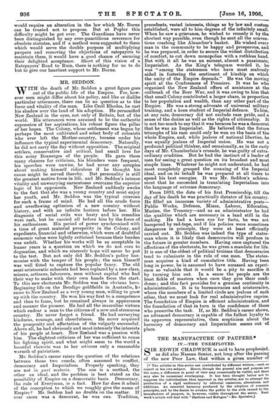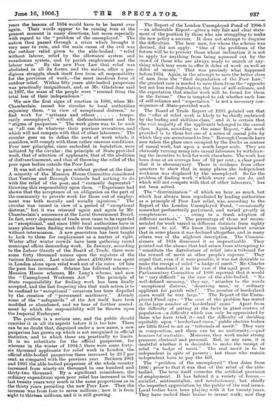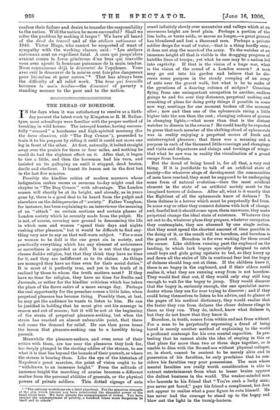THE MANUFACTURE OF PAUPERS.* IV. — THE UNEMPLOYED.
SIR EDWIN CHADWICK is said to have prophesied, as did also Nassau Senior, not long after the passing of the new Poor Law, that within a given number of
[• The articles in this series are contributed by different writers,—each an expert in his own subject. Hence, though the general aim and purpose are the same, a difference in point of view may occasionally be visible, and there may also be occasional overlapping. It has been thought better not to suppress the individualism thus apparent in the articles, nor to attempt the production of a rigid uniformity by editorial omissions, alterations, and additions. An essential harmony produced by the adoption of common principles, and by the desire to awaken the public to the evils caused by the manufacture of paupers, is, however, visible throughout the series. Next week's article will deal with "Shelters and Refuges."—En. Spectator.]
years the lessons of 1834 would have to be learnt over again. Their words appear to be coming true at the present moment in many directions, but more especially with regard to the " problem of the unemployed." The nation then passed through a crisis which brought it very near to ruin, and the main cause of the evil was the outdoor relief given to the able-bodied : " relief without labour, relief by the allowance system and roundsman system, and by parish employment and the labour rate." By the new Poor Law that relief was abolished in all its forms, and the nation, after a pro- digious struggle, shook itself free from all responsibility for the provision of work,—the most insidious form of outdoor relief. Within fifty years able-bodied pauperism was practically insignificant, and, as Mr. Gladstone said in 1897, the mass of the people were " rescued from the total loss of their independence."
We saw the first signs of reaction in 1886, when Mr. Chamberlain issued his circular to local authorities enjoining them, " in view of exceptional distress: to find work for " artisans and others tempo- rarily ,unemployed," .without disfranchisement and the " stigma of pauperism." The work given was to be such as " all can do whatever their previous avocations, and which will not compete with that of other labourers." The circular goes on to define the sorts of work which, it considers, will comply with these rather onerous conditions. Four new principles, since embodied in legislation, were initiated by the circular : the principle of State-provided work, that of selection of applicants, that of the abolition of disfranchisement, and that of throwing the relief of the poor upon bodies outside the Poor Law.
It was not allowed to pass without protest at the time. A minority of the Mansion House Committee considered that Vestries and Borough Councils had nothing to do with the relief of the poor, and " earnestly deprecated " throwing this responsibility upon them. "Experience had shown that the acceptance of an obligation on the part of the community to provide work for those out of employ- ment was both morally and socially injurious." The circular was issued in view of a period of " exceptional distress," but it was reissued again and again by Mr. Chamberlain's successors at the Local Government Board. In fact, every depression of trade soon came to be regarded as " exceptional, and since 1886 local authorities have in many places been finding.work for the unemployed almost without intermission. A new generation has been taught to look to them for employment as a matter of right. Winter after winter crowds have been gathering round municipal offices demanding work. In January, according to the Labour Gazette ,of the Board of , Trade, there were some, forty thousand names upon the registers of the various Bureaux.. Last winter about £100,000 was spent in London alone upon relief work out of the rates. Of late the pace has increased. Scheme has followed scheme,— Mansion House schemes, Mr. Long's scheme, and now the " Unemployed Workmen Act." The principle of State responsibility for finding work has been finally accepted, and the last lingering idea that such action is to be confined to " exceptional " occasions has been dispelled by the creation of "permanent machinery." Already some of the " safeguards " of the Act itself have been modified or abandoned, and we bear of further amend- ment by which the responsibility will be thrown upon the Imperial. Exchequer.
The position is a serious one, and the public should consider it in all its aspects before it is too late. There can be no doubt that, disguised under a new name, a new pauperism has grown up which is not recognised in official Statistics, and to which there are practically no limits. It is no substitute for the official pauperism, for whereas in the winter of 1904-5 there were some forty- six thousand applicants for relief work in London, the official able-bodied pauperism there increased by 23.7 per cent. as compared with the previous year. Between 1901 and-1905 the able-bodied pauperism of the whole country increased from ninety-six thousand to one hundred and thirty-two thousand. By a significant coincidence, the ordinary expenditure upon poor relief has increased in the last twenty years very much in the same proportions as in the thirty years preceding the new Poor Law. Then the increase was from four to seven millions ; now it is from eight td thirteen millions, and it is still growing. The Report of the London Unemployed Fund of 1904-5 —an admirable Report—gives a very fair and clear state- ment of the position by those who are struggling to make the new policy a success. It does not attempt to disguise the difficulties. The best men, for whom the scheme was devised, did not apply. " One of the problems of the future will be to prevent those whose inclination it is not to apply for anything from being squeezed out by the crowd of those who are always ready to snatch at any- thing which may seem to offer it doles of work as well as doles of money." That was precisely what happened before 1834. Again, in the attempt to save the better class of men from the " final degradation of the Poor Law," the greatest care is needed to save them from the" opposite but not less real degradation, the loss of self-reliance, and the expectation that similar work will be found for them in the future." One is tempted to ask whether such loss of self-reliance and "expectation " is not a necessary con- sequence of State-provided work.
The Board of Trade Report of 1893 pointed out that the "offer of relief work is likely to be chiefly embraced by the loafing and shiftless class," and it is certain that the vast majority of the applicants belonged to the casual class. Again, according to the same Report, " the work provided is to them but one of a series of casual jobs by which they are accustomed to live." Borough Councils have now taken the place once occupied by the Docks as centres of casual work, but upon a much larger scale. They are obviously turning many into casual labourers by withdraw- ing the incentive to look for work elsewhere. The work has been done at an average loss of 32 per cent., a clear proof that it is eleemosynary. There is evidence from other quarters to show that in many places the independent workman was displaced by the unemployed. So far the problem of finding work " which every one can do, and which will not compete with that of other labourers," has not been solved.
The " discrimination " of which we hear so much, but which has always been repudiated by leading authorities as a principle of Poor Law relief, was, according to the Report of the London Unemployed Fund, " occasionally somewhat perfunctorily performed, and varied greatly in completeness owing to a frank adoption of different methods." The percentage of those not recom- mended for work varied in different districts from eighty per cent. to nil. We know from independent sources that in some places it was declined altogether, and in many others was of the slightest description. The Commis- sioners of 1834 dismissed it as impracticable. They pointed out the abuses that had arisen from attempting to " constitute the distributors of relief into a tribunal for the reward of merit at other people's expense." They urged that, even if it were possible, it was not desirable to make the receipt of relief "a badge of merit." Mr. Charles Booth abandoned it in the case of the aged poor. The Parliamentary Committee of 1896 reported that it would be " very difficult " in the case of the able-bodied. " No well-defined meaning," they say, "attaches to the words exceptional distress,' deserving man,' or ordinary applicant for parish relief.' The number of borderland cases would be very " The Report of the Unem- ployed Fund says : " The crux of the problem has rested in the large number of borderland' cases." Apart from the difficulty of getting at the facts in great centres of population—a difficulty which can only be appreciated by those who have tried it—and the difficulty of deciding equitably upon " borderland cases," public elective bodies are little fitted to act as "tribunals of merit." They vary in composition, and there can be no uniformity,—quot hontines tot sententiae. Moreover, they work under strong pressure, electoral and personal. But, in any case, it is doubtful whether it is desirable to make the receipt of relief " a badge of merit." The real merit is to be independent in spite of poverty ; but those who remain independent have to pay the bill.
The " problem of the unemployed" thus dates from 1886; prior to that it was that of the relief of the able- bodied. The term itself connotes the artificial provision of employment. It has behind it a variety of forces,— socialist, sentimentalist, and revolutionary, but chiefly the imperfect appreciation by the public of the real issues. Local bodies have been playing with it for twenty years. They have racked their brains to invent work; now they confess their failure and desire to transfer the responsibility to the nation. Will the nation be more successful ? Shall we solve the problem by making it larger ? We have all heard of the droit du travail and of the ateliers nationaux of 1848. Victor Hugo, who cannot be suspected of want of sympathy with the working classes, said : " Les ateliers nationaux sont un exp6dient fatal. A ceux qui jusqu'alors avaient connu la, force genereuse d'un bras qui travaille vous avez ajoute la honteuse puissance de la main tendue. Nous connaissons d6ja le desceuvr4 de l'opulence. Vous avez tree le desceuvre de la misere cent fois plus dangereux pour lui-meme et pour autres." That has always been the difficulty of all relief work. The bras qui travaille becomes la main tendue—the desceuvre of poverty a standing menace to the poor and to the nation.












































 Previous page
Previous page